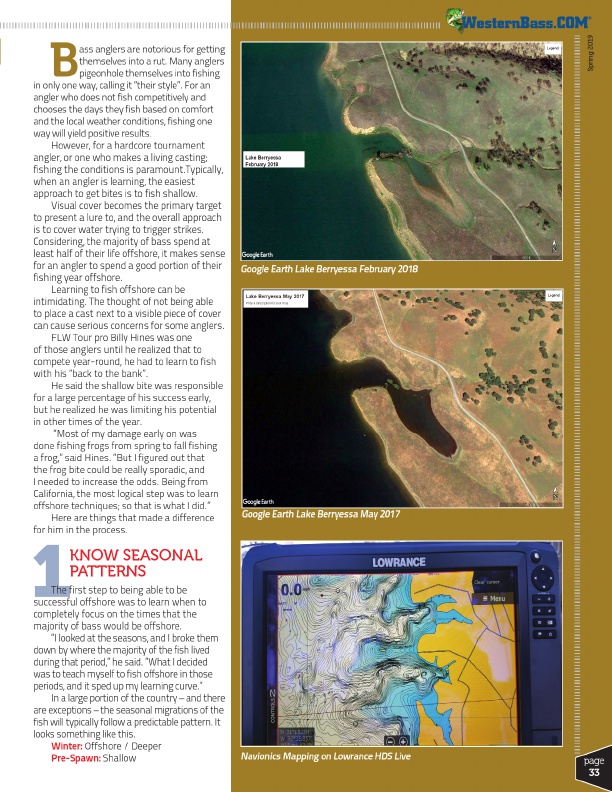
1 B
ass anglers are notorious for getting
themselves into a rut. Many anglers
pigeonhole themselves into fishing in only one way, calling it “their style”. For an
angler who does not fish competitively and
chooses the days they fish based on comfort
and the local weather conditions, fishing one
way will yield positive results.
However, for a hardcore tournament
angler, or one who makes a living casting;
fishing the conditions is paramount.Typically,
when an angler is learning, the easiest
approach to get bites is to fish shallow.
Visual cover becomes the primary target
to present a lure to, and the overall approach
is to cover water trying to trigger strikes.
Considering, the majority of bass spend at
least half of their life offshore, it makes sense
for an angler to spend a good portion of their
fishing year offshore.
Learning to fish offshore can be
intimidating. The thought of not being able
to place a cast next to a visible piece of cover
can cause serious concerns for some anglers.
FLW Tour pro Billy Hines was one
of those anglers until he realized that to
compete year-round, he had to learn to fish
with his “back to the bank”.
He said the shallow bite was responsible
for a large percentage of his success early,
but he realized he was limiting his potential
in other times of the year.
“Most of my damage early on was
done fishing frogs from spring to fall fishing
a frog,” said Hines. “But I figured out that
the frog bite could be really sporadic, and
I needed to increase the odds. Being from
California, the most logical step was to learn
offshore techniques; so that is what I did.”
Here are things that made a difference
for him in the process.
Google Earth Lake Berryessa February 2018 Google Earth Lake Berryessa May 2017
KNOW SEASONAL PATTERNS
The first step to being able to be successful offshore was to learn when to completely focus on the times that the majority of bass would be offshore.
“I looked at the seasons, and I broke them down by where the majority of the fish lived during that period,” he said. “What I decided was to teach myself to fish offshore in those periods, and it sped up my learning curve.”
In a large portion of the country – and there are exceptions – the seasonal migrations of the fish will typically follow a predictable pattern. It looks something like this.
Winter: Offshore / Deeper
Pre-Spawn: Shallow
Navionics Mapping on Lowrance HDS Live
®
Spring 2019
page
33